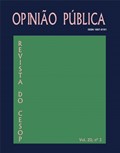Resumo
Este artigo analisa o uso de candidaturas para cargos mais altos, não só como evidência de ambição progressiva, mas também como fonte de benefícios eleitorais para o candidato. O argumento é que eleições alternadas para cargos nos diferentes níveis no sistema federativo permitem que até mesmo candidatos que perderam disputas por prefeituras tirem proveito da cobertura da campanha mais tarde na corrida por uma vaga na Câmara dos Deputados. A hipótese de que esse retorno eleitoral existe é testada por meio de modelos lineares e de máxima verossimilhança, usando dados das eleições para deputado federal em 2010, tendo em conta o desempenho dos candidatos em 2006 e se eles concorreram ou não para prefeito em 2008. Os resultados mostram que há benefícios eleitorais consideráveis para o candidato, mesmo para aqueles que perderam eleições para prefeito.
Abstract:
This article analyzes the use of candidacies for higher political offices, not only as evidence of progressive ambition, but also as a source of electoral benefits for the candidate. The argument is that alternating elections for different level positions in the federative system permit that even candidates who lost in mayoral races to take advantage of campaign coverage later in the race for a seat in the Chamber of Deputies. The hypothesis that this electoral return exists is tested by applying linear and maximum likelihood models on data from Brazilian federal deputy elections in 2010, taking into account their performance in 2006 and whether or not they ran for mayor in 2008. Results show that there are considerable late electoral benefits even for those who lost mayoral elections.
Keywords: alternating elections; federal deputy; mayor; career; Legislative
Referências
ABRAMSON, P. R.; ALDRICH, J. H.; ROHDE, D. W. “Progressive ambition among United States senators: 1972-1988”. The Journal of Politics, vol. 49, n° 1, p. 3-35, 1988.
ALMEIDA, A. Amnésia eleitoral: em quem você votou para deputado em 2002? E em 1998?. In: SOARES, G. A. D.; RENNÓ, L. R. (orgs.). Reforma política: lições da história recente. Rio de Janeiro: Editora FGV, p. 34-46, 2006.
AMES, B. “Electoral rules, constituency pressures, and pork barrel: bases of voting in the Brazilian Congress”. The Journal of Politics, vol. 57, n° 2, p. 324-343, 1995.
ARAÚJO, P. S. C. “Os poderes Executivo e Legislativo na definição das carreiras políticas no Brasil”. In: Anais do 36º Encontro Anual da Anpocs em Águas de Lindoia, 2012.
BLACK, G. S. “A theory of political ambition: career choices and the role of structural incentives”. The American Political Science Review, vol. 66, n° 1, p. 144-159, 1972.
BRACE, P. “Progressive ambition in the house: a probabilistic approach”. The Journal of Politics, vol. 46, n° 2, p. 556- 571, 1984.
CANON, D. T. “Sacrificial lambs or strategic politicians? Political amateurs in U. S. House elections”. American Journal of Political Science, vol. 37, n° 4, p. 1.119-1.141, 1993.
CARSON, J. L. “Strategy, selection, and candidate competition in U. S. House and Senate elections”. The Journal of Politics, vol. 67, n° 1, p. 1-28, 2005.
COPELAND, G. W. “Choosing to run: why House members seek election to the Senate”. Legislative Studies Quarterly, vol. 14, n° 4, p. 549-565, 1989.
FENNO JR., R. Home style: House members in their districts. Longman, 2008.
HIBBING, J. R. “Voluntary retirement from the U. S. House of Representatives: who quits?”. American Journal of Political Science, vol. 26, n° 3, p. 467-484, 1982.
HIBBING, J. R. “Legislative careers: why and how we should study them”. Legislative Studies Quarterly, vol. 24, n° 2, p. 149- 171, 1999.
JACOBSON, G. C. “Money and votes reconsidered: congressional elections, 1972-1982”. Public Choice, vol. 47, p. 7-62, 1985.
JACOBSON, G. C. “Campaign spending effects in U.S. Senate elections: evidence from the National Annenberg Election Survey”. Electoral Studies, vol. 25, n° 2, p. 195-226, 2006.
KAZEE, T. A. “The decision to run for the U. S. Congress: challenger attitudes in the 1970s”. Legislative Studies Quarterly, vol. 5, n° 1, p. 79-100, 1980.
LAVAREDA, A. A moldura das campanhas eleitorais brasileiras. In: SOARES, G. A. D.; LAVAREDA, A. (orgs.). A relevância da ciência política: comentários às contribuições de Olavo Brasil de Lima Jr. Rio de Janeiro: Revan, p. 247-278, 2014.
LEONI, E.; PEREIRA, C.; RENNÓ, L. “Estratégias para sobreviver politicamente: escolhas de carreiras na Câmara de Deputados do Brasil”. Opinião Pública, vol. 9, n° 1, p. 44-67, 2003.
LONG, J. Scott. Regressions models for categorical and limited dependent variables. Sage Publications, 1997.
MAESTAS, C. D., et al. “When to risk it? Institutions, ambitions, and the decision to run for the U. S. House”. American Political Science Review, vol. 100, n° 2, p. 195-208, 2006.
NICOLAU, J. “O sistema eleitoral de lista aberta no Brasil”. Dados, vol. 49, n° 4, p. 689-720, 2006.
NICOLAU, J. Sistemas eleitorais. Rio de Janeiro: Editora FGV, 2012.
POLSBY, N. W. “The Institutionalization of the U. S. House of Representatives”. American Political Science Review, vol. 62, n° 1, p. 144-168, 1968.
RENNÓ, L. R. O dilema do rico: número de candidatos, identificação partidária e accountability nas eleições de 2002 para a Câmara dos Deputados. In: SOARES, G. A. D.; RENNÓ, L. R. (orgs.). Reforma política: lições da história recente. Rio de Janeiro, Editora FGV, p. 47-68, 2006.
ROHDE, D. W. “Risk-bearing and progressive ambition: the case of members of the United States House of Representation”. American Journal of Political Science, vol. 23, n° 1, p. 1-26, 1979.
SAMUELS, D. J. Ambition, federalism, and legislative politics in Brazil. New York: Cambridge University Press, 2003.
SANTOS, F. “Recruitment and retention of legislators in Brazil”. Legislative Studies Quarterly, vol. 24, n° 2, p. 209-237, 1999.
ZILIAK, S. T.; MCCLOSKEY, D. N. The cult of statistical significance: how the standard error costs us jobs, justice and lives. Ann Arbor: The University of Michigan Press, 2007.
A Opinião Pública utiliza a licença do Creative Commons (CC), preservando assim, a integridade dos artigos em ambiente de acesso aberto.

